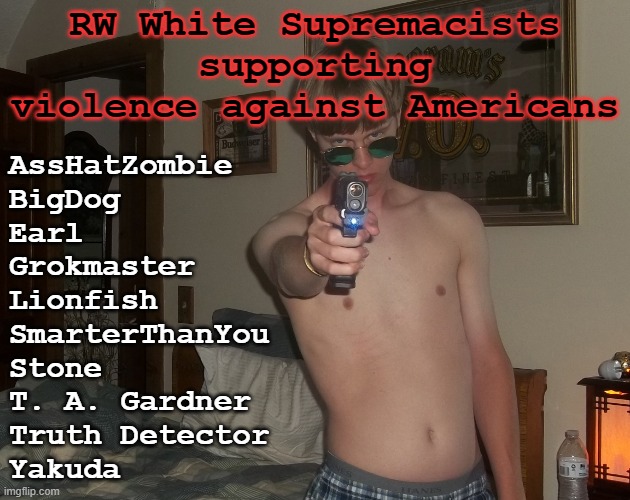Monad Portal
Was it me?
Tinfoil hat!! Make it!!!! Wear it!!!!!!!
keep lying. satan is waiting for you.
Tinfoil hat!! Make it!!!! Wear it!!!!!!!
In June 2011, the chairman and a subcommittee chairman of the House Energy and Commerce Committee, both Republicans, said that the FCC, in response to their requests, had set a target date of August 2011 for removing the fairness doctrine and other "outdated" regulations from the FCC's rulebook.[81]
I think it's mostly trolling and lying to themselves as well as to us. It's pretty clear what happened, they want us to believe no one else believes the irrefutable evidence. It's kind of like they're all doing some kind of affirmation to themselves, "J6 was just a peaceful tour". Yeah, twumptards.. sure.
Hello LurchAddams,
Only a few years back it was hard to imagine people voting for fascism. We underestimated Fox News.
keep lying. satan is waiting for you.
So they are the type of people who are comfortable bald faced lying on an obscure message board.
I wonder if it is a reflection of how willing they are to lie in real life to family, friends, spouses.
This from a lying pussy. I love the fairy tales, emphasis on fairy, that you create for yourself.
The young lady in that picture looks like the product of a society that handed out participation trophies and convinced her she was the most important person in the world. Leftist education at it's best.

^^^especially dems.
the green movement is designed to kill billions.
Which is why after WWII our nation made laws about news coverage
Then Republicans removed them
I think it's mostly trolling and lying to themselves as well as to us. It's pretty clear what happened, they want us to believe no one else believes the irrefutable evidence. It's kind of like they're all doing some kind of affirmation to themselves, "J6 was just a peaceful tour". Yeah, twumptards.. sure.
Hello evince,
But how can that be done while honoring the 1st Amendment?
In June 2011, the chairman and a subcommittee chairman of the House Energy and Commerce Committee, both Republicans, said that the FCC, in response to their requests, had set a target date of August 2011 for removing the fairness doctrine and other "outdated" regulations from the FCC's rulebook.[81]
The Rush Limbaugh show started in 1992
He could spew lies and never present a dissenting view of his lies
Hang on.. There's a knock at my door....
Nope, just Amazon trying to deliver your tinfoil to the wrong address...
https://en.m.wikipedia.org/wiki/FCC_fairness_doctrine
The fairness doctrine of the United States Federal Communications Commission (FCC), introduced in 1949, was a policy that required the holders of broadcast licenses both to present controversial issues of public importance and to do so in a manner that fairly reflected differing viewpoints.[1] In 1987, the FCC abolished the fairness doctrine,[2] prompting some to urge its reintroduction through either Commission policy or congressional legislation.[3] However, later the FCC removed the rule that implemented the policy from the Federal Register in August 2011.[4]
The fairness doctrine had two basic elements: It required broadcasters to devote some of their airtime to discussing controversial matters of public interest, and to air contrasting views regarding those matters. Stations were given wide latitude as to how to provide contrasting views: It could be done through news segments, public affairs shows, or editorials. The doctrine did not require equal time for opposing views but required that contrasting viewpoints be presented. The demise of this FCC rule has been cited as a contributing factor in the rising level of party polarization in the United States.[5][6]
While the original purpose of the doctrine was to ensure that viewers were exposed to a diversity of viewpoints, it was used by both the Kennedy and later the Johnson administration to combat political opponents operating on talk radio. In 1969 the United States Supreme Court, in Red Lion Broadcasting Co. v. FCC, upheld the FCC's general right to enforce the fairness doctrine where channels were limited. However, the court did not rule that the FCC was obliged to do so.[7] The courts reasoned that the scarcity of the broadcast spectrum, which limited the opportunity for access to the airwaves, created a need for the doctrine.
It’s an indication of how sick the people who adhere to the Republican party are
They saw that day
They watched the attack while it took place
Then they just absorbed the lie from fox that it was not what they saw with their own eyes
Mental weakness
the fairness doctrine was abolished in 1987.
Fairness Doctrine | The First Amendment Encyclopedia
By the 1980s, the fairness doctrine was losing clout. The deregulatory nature of the Reagan administration and the technological advances that were rendering scarcity arguments moot combined to pressure the FCC to abandon the doctrine. In 1987 the FCC formally abolished it. The doctrine, however, continues to have its defenders (Arbuckle 2017).
